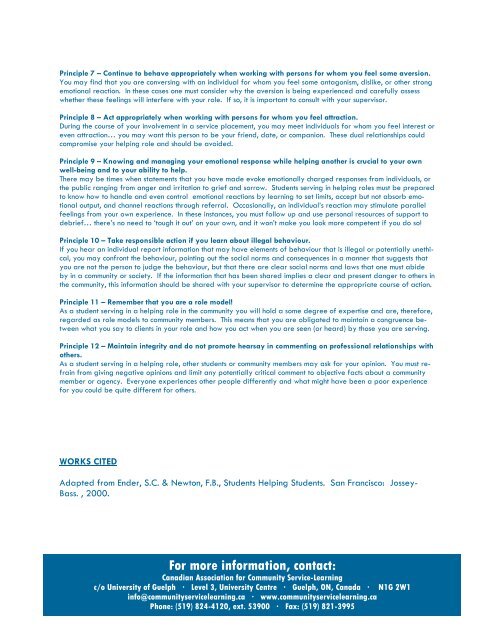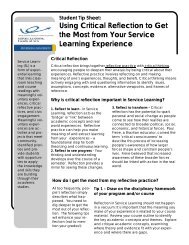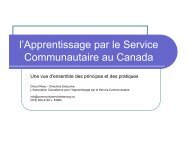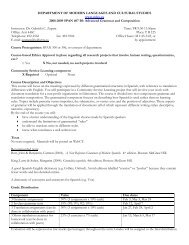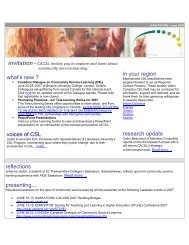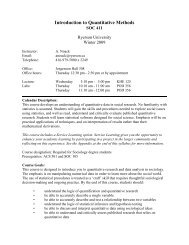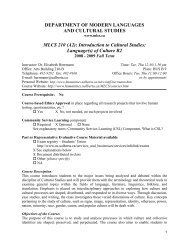Ethics.pub - Canadian Alliance for Community Service Learning
Ethics.pub - Canadian Alliance for Community Service Learning
Ethics.pub - Canadian Alliance for Community Service Learning
You also want an ePaper? Increase the reach of your titles
YUMPU automatically turns print PDFs into web optimized ePapers that Google loves.
Principle 7 – Continue to behave appropriately when working with persons <strong>for</strong> whom you feel some aversion.<br />
You may find that you are conversing with an individual <strong>for</strong> whom you feel some antagonism, dislike, or other strong<br />
emotional reaction. In these cases one must consider why the aversion is being experienced and carefully assess<br />
whether these feelings will interfere with your role. If so, it is important to consult with your supervisor.<br />
Principle 8 – Act appropriately when working with persons <strong>for</strong> whom you feel attraction.<br />
During the course of your involvement in a service placement, you may meet individuals <strong>for</strong> whom you feel interest or<br />
even attraction… you may want this person to be your friend, date, or companion. These dual relationships could<br />
compromise your helping role and should be avoided.<br />
Principle 9 – Knowing and managing your emotional response while helping another is crucial to your own<br />
well-being and to your ability to help.<br />
There may be times when statements that you have made evoke emotionally charged responses from individuals, or<br />
the <strong>pub</strong>lic ranging from anger and irritation to grief and sorrow. Students serving in helping roles must be prepared<br />
to know how to handle and even control emotional reactions by learning to set limits, accept but not absorb emotional<br />
output, and channel reactions through referral. Occasionally, an individual’s reaction may stimulate parallel<br />
feelings from your own experience. In these instances, you must follow up and use personal resources of support to<br />
debrief… there’s no need to ‘tough it out’ on your own, and it won’t make you look more competent if you do so!<br />
Principle 10 – Take responsible action if you learn about illegal behaviour.<br />
If you hear an individual report in<strong>for</strong>mation that may have elements of behaviour that is illegal or potentially unethical,<br />
you may confront the behaviour, pointing out the social norms and consequences in a manner that suggests that<br />
you are not the person to judge the behaviour, but that there are clear social norms and laws that one must abide<br />
by in a community or society. If the in<strong>for</strong>mation that has been shared implies a clear and present danger to others in<br />
the community, this in<strong>for</strong>mation should be shared with your supervisor to determine the appropriate course of action.<br />
Principle 11 – Remember that you are a role model!<br />
As a student serving in a helping role in the community you will hold a some degree of expertise and are, there<strong>for</strong>e,<br />
regarded as role models to community members. This means that you are obligated to maintain a congruence between<br />
what you say to clients in your role and how you act when you are seen (or heard) by those you are serving.<br />
Principle 12 – Maintain integrity and do not promote hearsay in commenting on professional relationships with<br />
others.<br />
As a student serving in a helping role, other students or community members may ask <strong>for</strong> your opinion. You must refrain<br />
from giving negative opinions and limit any potentially critical comment to objective facts about a community<br />
member or agency. Everyone experiences other people differently and what might have been a poor experience<br />
<strong>for</strong> you could be quite different <strong>for</strong> others.<br />
WORKS CITED<br />
Adapted from Ender, S.C. & Newton, F.B., Students Helping Students. San Francisco: Jossey-<br />
Bass. , 2000.<br />
For more in<strong>for</strong>mation, contact:<br />
<strong>Canadian</strong> Association <strong>for</strong> <strong>Community</strong> <strong>Service</strong>-<strong>Learning</strong><br />
c/o University of Guelph · Level 3, University Centre · Guelph, ON, Canada ·<br />
info@communityservicelearning.ca · www.communityservicelearning.ca<br />
Phone: (519) 824-4120, ext. 53900 · Fax: (519) 821-3995<br />
N1G 2W1


